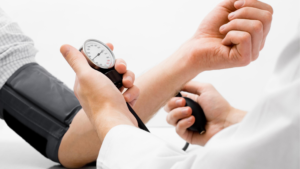What is Metoprolol?

Metoprolol is a type of medicine called a beta blocker. Like other beta blockers, Metoprolol works by slowing down your heart rate and making it easier for your heart to pump blood around your body. Metoprolol does this by changing the way your body responds to some nerve impulses, especially in the heart.The brand name for Metoprolol is Lopressor and Toprol XL.
What is it used for?
It is used alone or with other drugs to treat elevated blood pressure. It is also used to treat chest pressure or chest pan (also called angina). Another indication for this medication would be to treat heart failure. It can also be used to treat an irregular heart rate and rhythm called atrial fibrillation.It can be also used to after a heart attack to prevent future heart attacks. It can also be used off label to treat migraines or even an endocrinological emergency called thyrotoxicosis. In emergency situations it is used acute heart arrhythmia’s (such as acute ventricular tachycardia).

How is this drug taken?
This drug is taken once daily as directed by your Doctor orally. If you have the brand that contains metoprolol tartrate, this can be taken with or just after a meal as it is absorbed better that way. If you are taking the brand metoprolol succinate can be taken with or without food.
Metoprolol tartrate is typically administered in 2 to 3 divided daily doses and metoprolol succinate is usually administered once daily.
Metoprolol comes as immediate release and extended-release tablets & an extended-release capsule. Do not chew or bite these tablets as this can release the drugs ingredients at once increasing the chance of side effects. It comes in an injectable form as well which a healthcare provider can use,usually in the hospital setting and emergency situations.
17 tips to minimize or avoid Metoprolol side effects:
During your treatment some of these side effects may go away as your body adjusts to the medication.
- 1) This drug is going to lower your blood pressure (hypotension) and lower your heart rate (bradycardia). This might make you feel dizzy when you suddenly get up. Take your time when you are getting up esp. from a sitting position. Be careful going up and down stairs.
- 2) Metoprolol can affect your blood sugars. If you are a diabetic continue to carefully monitor your blood sugars
- 3) Metoprolol can cause different types of heart blocks; these are rare but can happen. Your Doctor will monitor for this by checking vital signs and your physical examination. He or she also can get an EKG to monitor for any changes.
- 4) Metoprolol can cause bronchospasms. Symptoms would be difficulty breathing and wheezing. Although because of the way metoprolol works (it works over a Beta1 receptor), the chance of this happening is less likely. However, if you have a bronchospastic disease such as Asthma you would be more susceptible to this. Tell your Doctor if you do have increasing cough, wheezing or SOB.

fatigue - 5) Beta Blockers such as Metoprolol do have central nervous system effects. They can cause fatigue, insomnia and in some cases sleep disturbances, this is because Beta Blockers slow down you heart rate and you will feel more tired as your heart rate slows down. Because of this you may want to take your first doses of Metoprolol at nighttime as it can make you feel sleepy. Once you are used to the medication you can switch to the morning with the help of your Doctor.
- 6) Beta Blockers slow your heart rate down. You are at an increased risk for depression. Your Doctor during your annual examination will be not only checking your HR ,but asking you questions regarding your mood.
- 7) Avoid drinking alcohol while taking this medication.
- 8) Beta Blockers can cause weight gain.The average weight gain is just over 2 lbs. (or just above 1kg) If you are using this medication for heart failure your Doctor can advise you whether this is a medication side effect or related to you heart failure.
- 9) This drug can cause skin reactions or rashes. Usually this in terms of numbers is less than 5% of the cases. Other skin problems include itching, gangrene of the skin and tissues and loss of hair. It has been associated in the worsening of psoriasis. If you have any of these changes alert your Doctor
- 10) Erectile dysfunction as well as impotence has been described with this drug in post marketing surveys. Follow up with your Doctor if that is the case to rule out other causes.
-

stomach pain 11) In less than 1% of cases it can cause GI symptoms such as constipation, diarrhea, nausea and stomach pain. These are usually self-limiting and should go away.
- 12) In older adults it can cause hallucinations, short term memory problems and confusion. If you are an older adult start the dose at the lowest dose and your Doctor should titrate the dose slowly to avoid side effects.
- 13) Beta Blockers can also affect you Lipid metabolism in particular your Triglycerides and HDL cholesterol. Make sure your Doctor checks your Lipid profile regularly
- 14) Beta Blockers such as Metoprolol are selective Beta Blockers. Your Doctor has to be cautious in severe PVD, as it can cause lower extremity pain. If you do have increased leg pain while walking alert your Doctor to this.Beta Blockers can be used in mild and moderate PVD
- 15) In acute exacerbation of heart failure your Doctor should not use Beta blockers. He or she can reintroduce the medication once your heart failure is compensated.
- 16) Drug-Drug Interactions: Metoprolol can interact with some of the following medications. This list is not exhaustive, but your Doctor or pharmacist can alert you to possible drug- drug interactions:
- Quinidine, fluoxetine,
- Paroxetine, and propafenone
- Monoamine oxidase (MAO inhibitors)
- Digitalis glycosides, clonidine, Diltiazem and verapamil
- 17) Never suddenly stop this medication without talking to your Doctor, especially at higher doses as it can cause an increase in your blood pressure and an elevated heart rate. In people with underlying heart disease, it can cause chest pain.
Have a good day and Think your Health.
Check entire video here.
Sources:
- Uptodate/metoprolol
- https://www.rxlist.com/lopressor-drug.htm#description
- https://www.goodrx.com/metoprolol
- https://www.accessdata.fda.gov/




